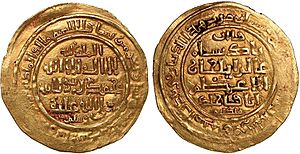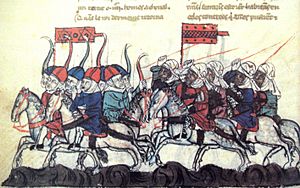Abaqa Khan facts for kids
Quick facts for kids
|
|
|---|---|
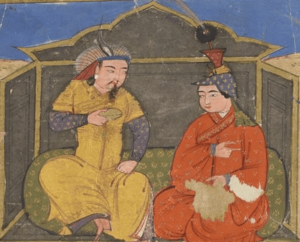
Abaqa enthroned with his khatun (possibly Dorji Khatun)
|
|
| Ilkhan | |
| Reign | 8 February 1265 – 1282 |
| Predecessor | Hulagu Khan |
| Successor | Ahmed Tekuder |
| Born | 27 February 1234 Mongolia |
| Died | 4 April 1282 (aged 48) Hamadan, Ilkhanate |
| Consort | Buluqhan Khatun |
| Issue | Arghun Gaykhatu Oljath El Qutlugh Khatun (daughter) |
| Dynasty | Borjigin |
| Father | Hulagu Khan |
| Mother | Yesuncin Khatun |
| Religion | Buddhism |
Abaqa Khan (born February 27, 1234 – died April 4, 1282) was an important Mongol ruler. He was the second Ilkhan of the Ilkhanate, a large Mongol kingdom. Abaqa was the son of Hulagu Khan, who founded the Ilkhanate. He ruled from 1265 to 1282. After his death, his brother Ahmed Tekuder became the next ruler.
Abaqa's time as ruler was often spent dealing with wars within the huge Mongol Empire. He also tried to invade Syria several times, but these attempts were not successful.
Contents
Life of Abaqa Khan
Abaqa was born in Mongolia on February 27, 1234. His father was Hulagu Khan, the founder of the Ilkhanate. Abaqa was a Buddhist. His father liked him a lot and made him the governor of Turkestan.
When Hulagu Khan died in 1265, Abaqa became the new Ilkhan. Before his father's death, Hulagu was planning to marry a daughter of the Byzantine Emperor Michael VIII Palaiologos. This daughter, Maria Palaiologina, arrived in 1265. Since Hulagu had died, she married Abaqa instead. The Mongols called her "Despina Khatun".
Abaqa decided that the main city for the Ilkhanate would be Tabriz. This city was in the northwestern grasslands, which the Mongols liked. Abaqa took power about four months after his father's death. He then spent several months giving out lands and positions to his officials.
Some coins from Abaqa's rule show a Christian cross. They also have an Arabic writing that says, "In the name of the Father, the Son and the Holy Spirit, only one God." This shows that Christians were present and important in his kingdom.
Military Campaigns
Abaqa Khan was involved in many military actions during his reign. He fought against other Mongol groups and tried to expand his empire.
Wars with the Golden Horde
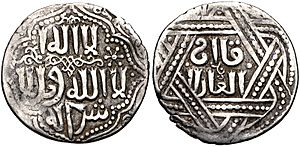
The Ilkhanate and the Golden Horde, another Mongol kingdom, had been fighting since Abaqa's father's time. This war continued when Abaqa became ruler. The Golden Horde invaded the Ilkhanate soon after he took power. This invasion was partly because the Golden Horde had an alliance with the Egyptian Mamluks. They wanted to keep Abaqa busy so he couldn't attack Syria, which the Mamluks controlled.
The fighting stopped when the Golden Horde's leader, Berke, died in 1267. The Great Khan Kublai, the overall leader of the Mongol Empire, tried to stop the civil war. Because of his influence, the Golden Horde's new leader, Möngke Temür, did not launch a big invasion. However, Möngke Temür still made an alliance with the Mamluk sultan Baibars. They promised to attack Abaqa together and share any lands they won.
Conflicts with the Chagataids
Ögedei's grandson Kaidu and Batu's grandson Mengu-Timur joined forces with Baraq of the Chagatai Khanate. They formed an alliance against Kublai Khan and Abaqa. They made Kaidu the ruler of Central Asia. This led to a long war called the Kaidu–Kublai war, which started in 1268.
In 1270, Baraq Khan of the Chagatai Khanate tried to take over Iran. This led to an attack on Abaqa, who was in the city of Herat. Abaqa successfully defended his lands. He also defeated Baraq's relative Teguder in Georgia. The next year, Abaqa sent his army to attack the Chagatai Khanate. They raided the city of Bukhara and nearby areas.
Invasions of Syria
Abaqa was one of many Mongol rulers who tried to work with Christian kingdoms in the West. He hoped to get their help against the Muslim Mamluks in Egypt and Syria.
Talks with Christian Leaders
Abaqa wrote letters to Pope Clement IV between 1267 and 1268. He also sent a Mongol ambassador to Europe in 1268. He wanted to form a Franco-Mongol alliance with his forces, Western armies, and his father-in-law Michael VIII. He received replies from Rome and from James I of Aragon. Abaqa also sent messengers to Edward I of England.
In 1274, Abaqa sent a Mongol group to Pope Gregory X at the Second Council of Lyons. Abaqa's secretary read a report to the meeting. He reminded them that Abaqa's father, Hulagu, was friendly towards Christians. He also promised that Abaqa planned to drive the Muslims out of Syria. However, these diplomatic efforts did not lead to any major help from Europe.
Campaign during the Ninth Crusade (1271)
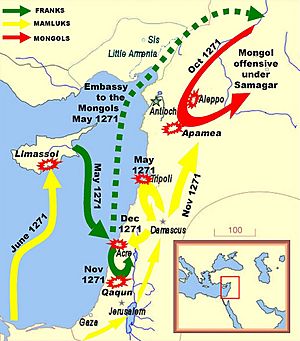
In 1271, Edward I of England arrived in Acre to lead a new Crusade. He sent messengers to Abaqa asking for military help. Abaqa was busy with other conflicts. But he agreed to help Edward. He sent 10,000 Mongol horsemen under General Samagar from Anatolia to Syria.
The Mongols attacked the land south of Aleppo. Even though their force was not huge, it caused many Muslims to flee. They remembered earlier Mongol attacks. Edward, however, could not gather his own forces to work with the Mongols. He also did not win any military victories. So, Abaqa's forces eventually left. When the Mamluk leader Baibars attacked again in November 1271, the Mongols had already gone back across the Euphrates river.
Campaigns of 1280–1281
The Mamluk leader Baibars died in 1277. In 1280 and 1281, Abaqa started new attacks against Syria. In September 1280, the Mongols took over Baghras and Darbsak. They captured Aleppo on October 20. The Mongols asked the Crusaders in Acre for military help. But the Crusaders had a 10-year truce with the Mamluks. They did not join the fight.
Abaqa and Leo III encouraged the Franks (Crusaders) to start a new Crusade. Only the Hospitallers and Edward I (who couldn't come) responded positively. The Mongols eventually retreated, promising to return in the winter of 1281.
Battle of Homs (1281)
The announced Mongol invasion began in September 1281. They were joined by Armenian soldiers led by Leo III. About 200 Hospitalier knights from the fortress of Marqab also joined them. These knights felt they were not bound by the truce with the Mamluks.
On October 30, 1281, about 50,000 Mongol troops fought against the Muslim leader Qalawun at the Second Battle of Homs. They were joined by 30,000 Armenians, Georgians, Greeks, and Hospitalier Knights. However, the Mongols and their allies were defeated in this battle.
Death and Succession
Abaqa died in Hamadan on April 4, 1282. He likely died from a serious illness. In 1285, his finance minister was accused of poisoning him, but this is not certain.
After Abaqa's death, his wife Maria went back to Constantinople. She became a nun and founded a church.
Abaqa was followed by his brother Tekuder. Tekuder had become a Muslim. He changed Abaqa's policies that favored Christians. Tekuder suggested an alliance with the Mamluk Sultan Qalawun. Qalawun then continued attacking Frankish lands.
In 1284, Abaqa's son Arghun led a successful rebellion. He was supported by Kublai, the Great Khan. Arghun had his uncle Tekuder executed and took power himself. He brought back the pro-Christian policies that Abaqa had followed.
Abaqa's younger son, Gaykhatu, became ruler in 1291.
Family
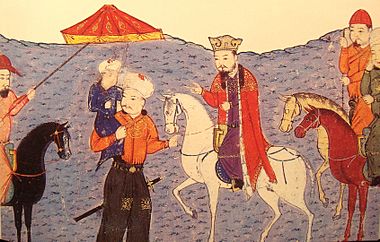
Abaqa had many wives and children. Some of his notable children include:
- Arghun
- Gaykhatu
- Oljath
- El Qutlugh Khatun (daughter)
|
See also
 In Spanish: Abaqa Kan para niños
In Spanish: Abaqa Kan para niños
 | May Edward Chinn |
 | Rebecca Cole |
 | Alexa Canady |
 | Dorothy Lavinia Brown |


